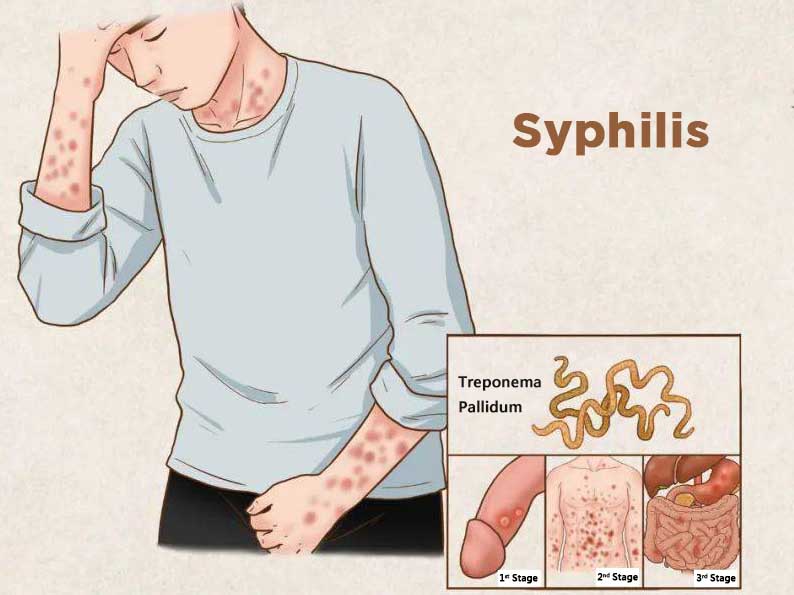
What is Syphilis? Understanding Symptoms, Stages, and Treatment
Introduction: What is Syphilis?
Syphilis is caused by Treponema pallidum. It can spread through vaginal, anal or oral sex with an infected partner, making it a sexually transmitted infection (STI) with potentially severe health consequences if left untreated.. The obvious symptom is the appearance of open ulcerative sores on the genitals, mouth, anus or rectum, which is called chancre.
How is Syphilis Transmitted?
Syphilis spreads primarily through direct contact with a syphilis sore during vaginal, anal, or oral sex. These sores can occur on or around the penis, vagina, anus, rectum, lips, or in the mouth.
The Four Stages of Syphilis
Understanding syphilis requires knowledge of its progression through distinct stages, each with different symptoms and health implications.
Primary Syphilis
The first stage typically appears 3-90 days after exposure (average 21 days).
Key Symptoms:
- Chancre: A single, firm, round, painless sore at the infection site
- Sore location: Genitals, anus, rectum, lips, or mouth
- Healing without treatment: 3-6 weeks (but infection progresses)
Secondary Syphilis
This stage develops 4-10 weeks after the chancre appears.
Key Symptoms:
- Skin rash: Often on palms and soles, doesn't itch
- Fever, fatigue, and sore throat
- Headaches and muscle aches
- Patchy hair loss
- Swollen lymph nodes
- White patches in the mouth
- Condylomata lata (grayish-white skin lesions)
Latent Stage
The "hidden" stage where no visible symptoms are present.
- Early latent: Within the first year of infection
- Late latent: After one year of infection
- Infection remains active in the body
- Can last for years without symptoms
Tertiary Syphilis
This severe stage can appear 10-30 years after initial infection.
Complications Include:
- Gummas (large ulcers throughout body)
- Neurosyphilis (brain and nerve damage)
- Cardiovascular problems (heart and blood vessel damage)
- Organ damage (brain, nerves, eyes, heart, liver)
- Mental illness and personality changes
- Memory loss and cognitive decline
Diagnosis and Testing
Who Should Get Tested?
- Pregnant women (routine screening)
- Sexually active individuals with multiple partners
- Men who have sex with men
- People with HIV
- Anyone with symptoms of syphilis
- Individuals with a partner diagnosed with syphilis
Testing Methods:
- Blood tests (RPR, VDRL, TP-PA)
- Direct examination of fluid from sores
Syphilis Treatment
Syphilis can be cured with antibiotics. If not treated in time, syphilis will go through different stages of the disease, each stage has different symptoms, which can imitate other diseases.
In extreme cases, syphilis can invade the nervous system, causing
- headaches,
- behavior changes,
- poor coordination, and
- dementia.
Syphilis Prevention
Always using condoms correctly, long-term monogamy and abstinence are the best ways to protect yourself from syphilis and other sexually transmitted infections.
Syphilis statistics
According to the World Health Organization (WHO), the global prevalence of syphilis was estimated to be 19.9 million in 2016 (or 0.5% in men and 0.5% in women aged 15-49), and the estimated global incidence was 6.3 million new cases (or 1.6 per 1000 men and 1.7 per 1000 women). World Health Organization. Report on global sexually transmitted infection surveillance 2018. The presence of syphilitic sores (chancre) also increases the chance of acquiring other STDs, including HIV. It has been reported that people with syphilis infection are 2-5 times more likely to contract HIV.
REF:
HIV Prevention Through Early Detection and Treatment of Other Sexually Transmitted Diseases -- United States Recommendations of the Advisory Committee for HIV and STD Prevention https://www.cdc.gov/mmwr/preview/mmwrhtml/00054174.htm ).
(Text Only)

